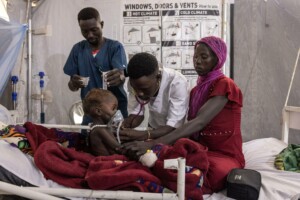Red Cross’ first aid distribution in Jebel Marra, Darfur
The International Committee of the Red Cross has carried out its first distribution of essential household supplies in Golo, Jebel Marra, in more than 10 years. After banning the aid organisation from the region, the government has allowed Red Cross to resume field activities in Sudan.
 ICRC wokers in Golo together with the Sudanese Red Crescent Society members pile-up essential household items and prepare their distribution to vulnerable families in Jebel Marra, late 2017 (ICRC)
ICRC wokers in Golo together with the Sudanese Red Crescent Society members pile-up essential household items and prepare their distribution to vulnerable families in Jebel Marra, late 2017 (ICRC)
The International Committee of the Red Cross has carried out its first distribution of essential household supplies in Golo, Jebel Marra, in more than 10 years. After banning the aid organisation from the region, the government has allowed Red Cross to resume field activities in Sudan.

The items were distributed to displaced families and voluntarily returning families in Golo, at the foot of the Jebel Marra massive in Central Darfur late last year, the Committee of the Red Cross (ICRC) writes on its website. It estimated that 1,500 people from over 100 villages around Jebel Marra have benefited from the distribution, which lasted a week.
Reportedly hundreds of women waited for the ICRC and Sudanese Red Crescent Society (SRCS) workers piling up the household items, such as blankets and mosquito nets, before carrying the items back. Some of the women had walked up to 20 kilometres to reach the distribution point and discussed lending donkeys to eachother.
A woman named Hawa raised her hands in the air to give thanks, saying: “It's getting colder by the day in the mountain, and I only have one blanket to cover my three children with. Now I will be warm at night too.”
Most of the beneficiaries were elderly women. Many men in the region had either been killed during conflict or fled the area. Some women were victims of the conflict, too. “I was running too but was shot in the leg,” said Um Hagain, 47. She explained how she could not run as fast as others because her mother was too old to keep up.

The Omda of Golo addressed the crowd saying that only those with the greatest needs would be receiving assistance this time. “The ICRC is not like other organizations that give assistance and leave,” he said. “They hand over everything to the beneficiary and make sure they have received their items.”
Improved access as criterium
The Red Cross has been working in Sudan since 1978 and extended its operations to Darfur in 2003. On 1 February 2014, the Sudanese authorities suspended Red Cross activities in Sudan. The ICRC and twelve other foreign organisations were expelled in what was President Omar Al Bashir’s response to the International Criminal Court’s arrest warrant for him in 2009.
Sudan suspended the organisation despite its mandate that is set out in the Geneva Conventions and their Additional Protocols, to which Sudan, along with 194 other States, is party.
Khartoum’s stance towards foreign aid organisations changed when the improvement of access for humanitarian organisations in Sudan became one of the five tracks the United States assessed Sudan on, as a criterium for the possible lifting of economic sanctions that had been in place since 1997.
In September last year, the ICRC and Khartoum discussed the resumption of aid activities in the regions of Darfur and South Kordofan.
The US repealed the economic sanctions against Sudan on October 6, 2017, according to the Department of State “in recognition of the Government of Sudan's sustained positive actions to maintain a cessation of hostilities in conflict areas in Sudan, improve humanitarian access throughout Sudan, and maintain cooperation with the US on addressing regional conflicts and the threat of terrorism.”
In addition negotiations between Khartoum and the UN Children’s Fund (Unicef) resulted in access for this organisation to Kurmuk (Blue Nile), as well as in Golo (Central Darfur) and Belle El Sereif (South Darfur).
So far, Washington's decision leaves other sanctions in place for the time being, including those against individuals with arrest warrants related to atrocities committed during the conflict in Darfur. It does not remove Sudan from the list of state sponsors of terrorism.











 and then
and then